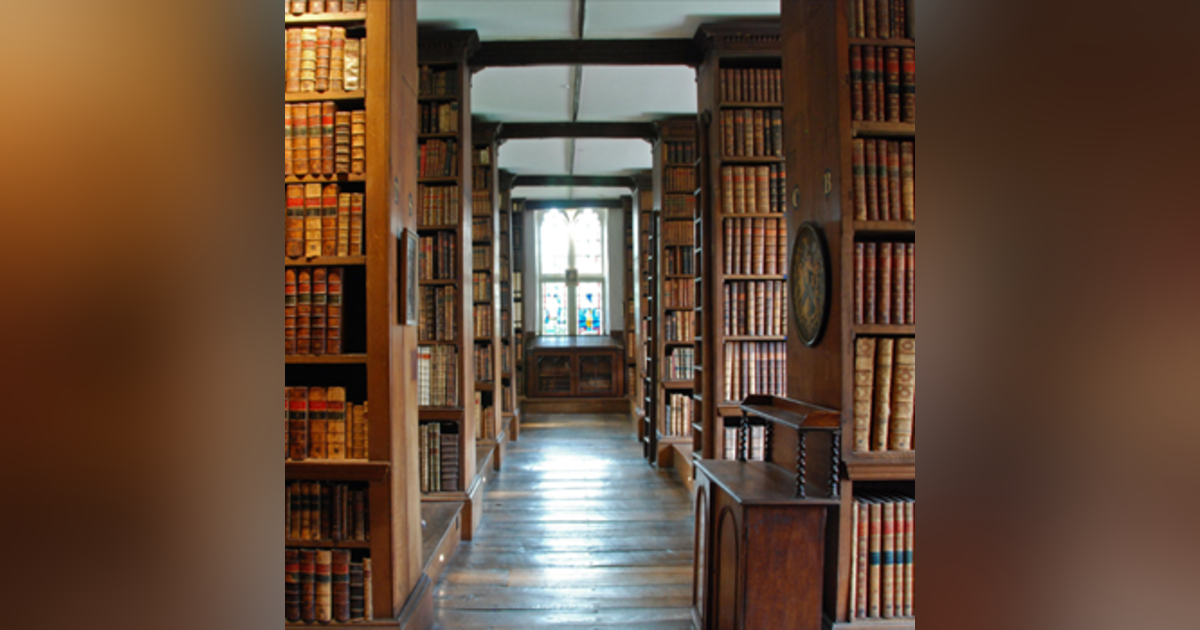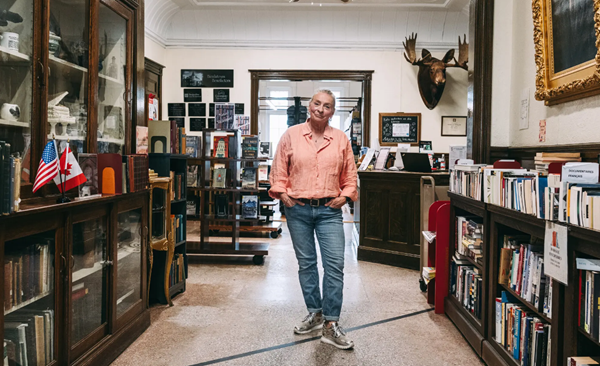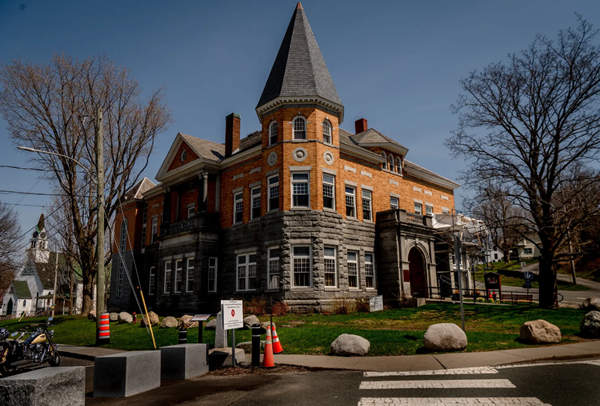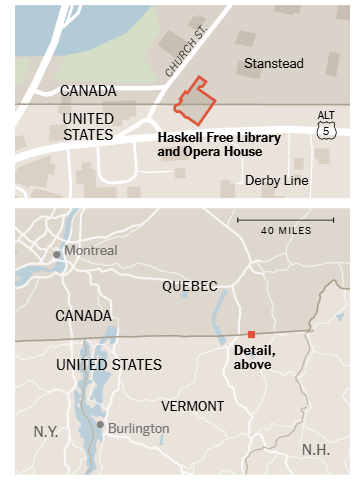A Border-Crossing: Canadian Library's Fate

Show notes Learn how a library was deliberately built on the borders of Canada and U.S.A, as a symbol of shared community, showing how physical lines on a map can foster unity rather than division. Supporting links 1. Haskell Free Library and Opera House [YouTube] 2. Haskell Free Library and Opera House [Website] 3. Haskell Free Library and Opera House [Google Maps] 4. A Century of History on the Canada-U.S. Bor...
Show notes
Learn how a library was deliberately built on the borders of Canada and U.S.A, as a symbol of shared community, showing how physical lines on a map can foster unity rather than division.
Supporting links
1. Haskell Free Library and Opera House [YouTube]
2. Haskell Free Library and Opera House [Website]
3. Haskell Free Library and Opera House [Google Maps]
4. A Century of History on the Canada-U.S. Border [qahn.org]
Contact That's Life, I Swear
- Visit my website: https://www.thatslifeiswear.com
- Twitter at @RedPhantom
- Bluesky at @rickbarron.bsky.social
- Email us at https://www.thatslifeiswear.com/contact/
Episode Review
- Submit on Apple Podcast
- Submit on That's Life, I Swear website
Other topics?
- Do you have topics of interest you'd like to hear for future podcasts? Please email us
Interviews
- Contact me here https://www.thatslifeiswear.com/contact/, if you wish to be a guest for a interview on a topic of interest
Listen to podcast audios
- Apple https://apple.co/3MAFxhb
- Spotify https://spoti.fi/3xCzww4
- My Website: https://bit.ly/39CE9MB
Other
- Music ...
⏱️ 16 min read
Imagine a place where you could read a book in Vermont and step across the aisle into Quebec, Canada; for a concert — all under the same roof. Pretty cool, eh?
A century-old symbol of cross-border friendship, the Haskell Free Library and Opera House straddles the line between the U.S. and Canada. But today, that line has become a wall."
You will now need not only a library card to check out a book but also a passport.
Welcome to That's Life, I Swear. This podcast is about life's happenings in this world that conjure up such words as intriguing, frightening, life-changing, inspiring, and more. I'm Rick Barron your host.
That said, here's the rest of this story
The Great Library Standoff: A Border Comedy of Errors
So, what happens when books become weapons of mass distraction?
Picture this absurd scene: In an age when politicians treat international relations like a reality TV show and diplomacy resembles a Twitter beef, one unsuspecting library has become ground zero for a ridiculous border dispute.
Sylvie Boudreau, president of the Haskell Library’s board of trustees. Courtesy of The New York Times
Our story begins over a century ago when Martha Stewart Haskell—no relation to the Martha Stewart who made prison orange fashionable, but a different wealthy widow with impeccable taste and zero ability to predict future political insanity, decided in 1901 to construct what can only be described as the world's most optimistic building project.
Martha, who inherited her husband's lumber business upon his passing, possessed more civic spirit than common sense, and commissioned architects to build a magnificent structure of stone and glass that would make even the most jaded Instagram influencer weep with architectural envy.
The end result was the Haskell Free Library and Opera House, completed in 1904.
It sounded like a great idea at the time, but here's where Martha's plan went off the rails. She insisted this palatial tribute to learning and culture be positioned directly atop the invisible line separating Canada and the United States. Not near the border, mind you, but straddling it like a well-dressed colossus of cooperation. Inside, a strip of black tape marked the international boundary, running across polished floors like the world's least threatening DMZ.
For over a century, this arrangement worked beautifully. Canadians and Americans wandered freely between countries with all the concern of someone switching lanes in a parking lot. The Haskell Free Library and Opera House became a testament to the quaint notion that neighbors could get along. Yes, perish the thought.
Enter the Orange Tornado
Fast-forward to our current era of political performance art, where international relations are conducted with all the subtlety of a monster truck rally. Enter Donald Trump, a man who approaches diplomacy with the same delicate touch he applies to his morning Twitter storms. His latest brilliant idea? Transform America's polite northern neighbor into the 51st state, presumably because managing 50 states has been going so swimmingly.
This masterstroke of geopolitical genius has sent this library, a building whose most controversial decision in 120 years was probably choosing between Dewey decimal classifications, into the crosshairs of a border security crisis.
The crackdown at the library and opera house followed a visit in January of 2025 by Kristi Noem, the U.S. Secretary of Homeland Security. The U.S. authorities had been pressing to restrict access to the Haskell in recent years, even suggesting that Canadians and Americans take turns visiting it, according to library officials.
Inside the library, Ms. Noem and her entourage stood on the south side of the black tape while facing the library staff on the other side. U.S. officials described illicit cross-border episodes involving the library, while library officials argued that they had beefed up security.
All of a sudden, Ms. Noem stepped over the tape and back a couple of times, saying, "51st state, U.S.," as her entourage giggled, the library officials were left speechless.
"I was embarrassed because I'm American," said Kathy Converse, a longtime volunteer at the Haskell and its unofficial historian. "The other ladies, I think, were just stunned because they're all Canadian — and offended."
The Great Canadian Exile
The fallout from this theatrical display of governmental wisdom was swift and merciless. U.S. authorities, apparently convinced that the greatest threat to national security was Canadian grandmothers seeking large-print mysteries, implemented restrictions so draconian they would make airport security jealous.
Starting in March of 2025, accessing this den of Liberian terrorism became more complicated than getting a mortgage. Canadians who once strolled casually across an invisible line to borrow books now face a bureaucratic gauntlet that would challenge even the most determined scholar. Want to read the latest John Grisham? You'd better bring your passport, proof of income, three references, and possibly a blood sample.
The new regime requires Canadian visitors to trek to an official border crossing, submit to the full theatrical production of international entry (including the traditional "purpose of your visit?" interrogation), and then return to the library like conquering heroes who've successfully navigated the maze network of customs and immigration—all to check out a cookbook.
Meanwhile, unauthorized Canadian infiltrators—presumably those dangerous individuals attempting to access public services without proper documentation—now face arrest, prosecution, and deportation. Yes, you read that correctly: people are being threatened with criminal charges for the heinous act of trying to use a library. Somewhere, Benjamin Franklin is spinning in his grave.
The Resistance (Armed with Library Cards)
Not to be outdone by government bureaucracy, the library staff and local communities have mounted what can only be described as the most polite resistance movement in modern history. Led by volunteers whose idea of civil disobedience involves strongly worded letters to newspaper editors, they've implemented a campaign of passive-aggressive defiance that would make Gandhi proud.
The Haskell Free Library and Opera House has straddled the border since 1904, the brainchild of a wealthy widow who chose the location for its symbolism and its equal access to Canadians and Americans. Courtesy of The New York Times
Kathy Converse, the library's unofficial historian and professional keeper of righteous indignation, has become the unlikely voice of cross-border academic freedom. Her reaction to the secretary's tap-dancing routine perfectly captured the sentiment of anyone with functioning brain cells: mortified embarrassment at the sheer theatrical stupidity of it all.
The Canadian response has been characteristically understated. Where Americans might have organized torch-wielding mobs or at least a strongly worded Facebook group, Canadians have responded with hurt feelings and the occasional "sorry" for existing near an international boundary. Their most rebellious act? Using the back door with makeshift carpet walkways—the kind of revolutionary behavior that would make the Boston Tea Party look like a violent insurrection.
Security Theater Meets Community Theater
The government's justification for this dramatic lockdown reads like a rejected script from a political satire show. According to official sources, this innocent repository of books and community theater has become a superhighway for international crime, with smugglers using the building as their distribution center.
Now, to be fair, according to U.S. Customs and Border Protection, the library "continues to be leveraged by individuals attempting to enter the U.S. illegally and smuggle commodities."
In 2018, a Canadian man was sentenced to 51 months in prison for smuggling more than 100 handguns from Vermont into Quebec — including several firearms hidden in backpacks that were brought into the library from the United States, left in a bathroom trash can, retrieved and then sold in Canada.
This single incident has convinced authorities that every book club meeting is a potential criminal conspiracy and every poetry reading a cover for international terrorism.
In response to these significant security concerns, the library has implemented measures that would rival those of a high-security prison. Staff members now patrol the building with the vigilance of Secret Service agents, surveillance cameras lurk in birdhouses like mechanical owls, and family reunions have been banned as potential covers for international criminal syndicates.
The irony is so thick you could cut it with a library card: a building dedicated to the free exchange of ideas and culture has become a fortress of bureaucratic paranoia, where the greatest threat to national security is someone from Quebec trying to attend a book club discussion of "Pride and Prejudice."
"They've come from Germany, Switzerland, France, Japan, so many!" said Sylvie Boudreau, president of the library's board of trustees. "Martha Stewart Haskell deliberately wanted the library on the border. But I don't think that in 1901 she could have ever imagined where we'd be today."
The GoFundMe Revolution
In a plot twist that would make even the most imaginative novelist envious, the library's plight has captured the attention and wallets of people worldwide. A crowdfunding GoFundMe campaign has raised nearly $200,000 Canadian (approximately $147,000 American, or roughly what the government spends on office supplies for a medium-sized agency per week) to fund renovations that will accommodate the new reality of living in a world where checking out books requires international travel documentation.
Location of the Haskell Free Library. Courtesy of The New York Times
The renovation plans read like something from a dystopian novel: separate entrances for different nationalities, dedicated walkways to prevent dangerous mingling, and parking areas segregated by passport color. It's like segregation, but for library users, and somehow even more ridiculous.
Steve Timmins, a Canadian visitor whose crime was wanting to read while existing north of an imaginary line, perfectly captured the surreal nature of the situation: the image of a small library being bullied by the full weight of a superpower's bureaucratic machinery has resonated with people who recognize governmental overreach when they see it, even when it's dressed up in the rhetoric of national security.
The Bigger Picture of Small-Town Absurdity
This library drama isn't happening in a vacuum—it's part of a larger comedy of errors playing out across the entire border region. Communities that once treated the international boundary like a minor inconvenience now find themselves separated by an invisible wall of bureaucratic red tape and political theater.
Fran Gonter-Gross, an American resident who has the audacity to want her Canadian neighbors to access public services, represents the voice of reason in this manufactured crisis. Her reaction—describing the entire situation as "insane"—demonstrates that at least some people retain their grip on reality in an era when government officials treat library policy like matters of national defense.
The transformation of these border communities from integrated neighborhoods into segregated zones reveals the human cost of political grandstanding. Families separated by bureaucracy, friendships strained by passport requirements, and community institutions turned into symbols of division rather than unity—all for the sake of scoring political points in a game most residents never asked to play.
The International Media Circus
As if the situation wasn't absurd enough, the library has become an international tourist attraction.
Sylvie Boudreau, the library board president and former border officer who has watched this transformation with the weary resignation of someone who understands both sides of institutional insanity, has become an unwilling spokesperson for common sense in an age of uncommon stupidity. Her observation that Martha Stewart Haskell could never have imagined this outcome reveals the fundamental disconnect between the library's founding vision and current political reality.
The media attention has turned the library into a symbol that extends far beyond its original purpose. International observers view this small-town drama as a microcosm of larger issues: the tension between security and freedom, the cost of political extremism, and the human consequences of bureaucratic overreach.
The Ultimate Irony
Perhaps the most delicious irony of this entire situation is that a building dedicated to learning, culture, and the free exchange of ideas has become a battleground for everything contrary to those values. A library—literally a temple to human knowledge and understanding—has been transformed into a symbol of division, suspicion, and the kind of small-minded thinking that education is supposed to cure.
The black tape that once symbolized friendship between nations now represents the arbitrary lines that governments draw when they run out of actual problems to solve. The opera house that once hosted performances celebrating human creativity now witnesses the performance art of political theater at its most ridiculous.
Martha Stewart Haskell's vision of a building that would bring communities together has survived world wars, economic depressions, and countless political upheavals, only to be threatened by the petty tyranny of bureaucrats who see international terrorism in book clubs and national security threats in library card applications.
The Last Laugh
As this story continues to unfold with all the predictability of a political farce, one thing remains clear: the real threat to democracy isn't foreign infiltration through library back doors—it's the kind of thinking that sees libraries as security risks and librarians as potential enemy agents.
The Haskell Free Library and Opera House will likely survive this latest assault on common sense, just as it has survived every other historical absurdity of the past century. The building will adapt, the communities will endure, and future generations will look back on this episode with the same bewildered amusement we reserve for other historical moments when adults temporarily lost their minds.
In the meantime, the library stands as a monument to both human optimism and human folly—a reminder that while we can build bridges between nations, we can also turn those bridges into obstacles with nothing more than political paranoia and a roll of black tape.
And somewhere in the great beyond, Martha Stewart Haskell is probably wondering why she didn't just build a simple, non-controversial barn instead.
What can we learn from this story? What's the takeaway?
Borders Are Both Real and Symbolic: The library was deliberately built on the border as a symbol of shared community, showing how physical lines on a map can foster unity rather than division.
Ultimately, the story reminds us that borders don't have to be walls — they can be bridges, as long as we value and defend the spaces that nurture connection. The Haskell Library's story is about the resilience of community, even when governments and security concerns threaten to shut doors that were always meant to be open.
Well, there you go, my friends; that's life, I swear
For further information regarding the material covered in this episode, I invite you to visit my website, which you can find on Apple Podcasts for show notes and the episode transcript.
As always, I thank you for the privilege of you listening and your interest.
Be sure to subscribe here or wherever you get your podcast so you don't miss an episode.
See you soon.













